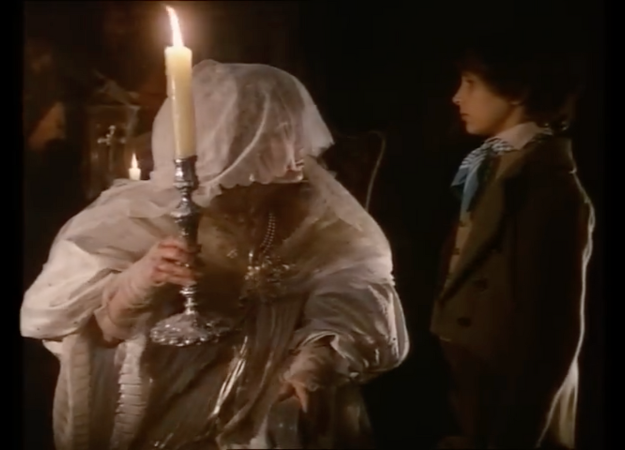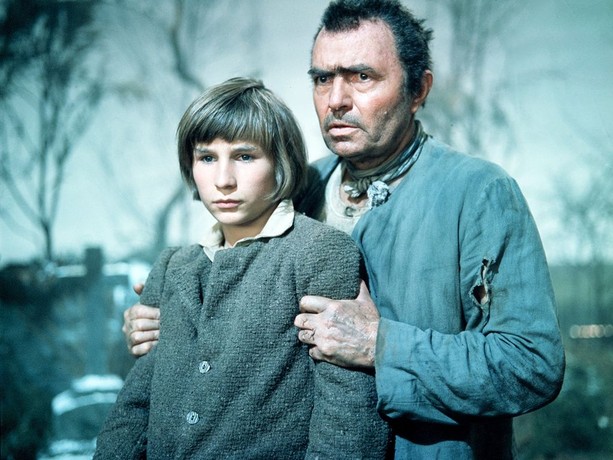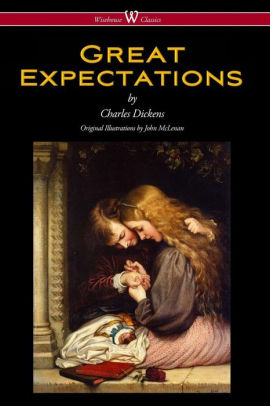Don't miss your chance to invest in 'Fabiola'!
Visit our crowd-funding page to help make Catholic movies!
- Home
- Books Made into Movies
- Great Expectations
Disclaimer: As an Amazon Associate, I receive a small commission if you purchase items on this page at no extra cost to you.
Exploring Great Expectations: A Tale of Pride, Fall, and the True Measure of Character
Through humbled and thoroughly loyal characters, Charles Dickens shines light on the fact that social class has nothing to do with character formation and happiness in his classic novel, Great Expectations.
This story is the timeless tale of a young blacksmith who goes to London when a great fortune falls into his lap. In the confusion of this sudden shift of fortune, this young man becomes a snob and casts off all of his old friends. When he reaches rock bottom, he is surprised to learn how ungrateful he has been to these friends as they are the only ones who surround him in his time of need.
There have been many film adaptations of Charles Dickens' novel. All of course have admirers who claim that each adaptation is the best and most true to the story. There is the old 1946 version with a young Jean Simmons cast as the young Estella. Then, of course, there is the Disney mini series made in 1989 with the same Golden Age actress this time appearing as old Miss Havisham (and the best portrayal of the character in our opinion).
Another version worth the watch is the 1974 British-made film with James Mason playing the role of Magwitch. We are able to recommend all three of these adaptations, but read below to see what we loved about them, where they didn't quite hit the mark, and what we think could have been better.
A Faithful Journey Through Dickens: The 1989 Great Expectations Mini-Series Delivers Depth, Drama, and Timeless Charm
The 1989 mini series of Great Expectations stands out for its masterful capture of the novel's spirit and faithfulness to Dickens' work. In it, those who have read the book will be delighted with the detail that went into this adaptation.
The particular charm of this adaptation comes from the fact that it takes its time telling the story. There are many twists and complexities in the original novel and having the 6 episodes really makes the story very digestible and less confusing.
Was it something to be viewed again and again like the 1995 mini series of Pride and Prejudice? Perhaps not, but take the time to watch this version because it is definitely well worth the watch with great portrayals of Charles Dickens' characters by Anthony Hopkins, Anthony Calf, John Rhys-Davies, and Jean Simmons.
A Cut to the Chase and Surprisingly Complete Take on Great Expectations (1974)
The 1974 made-for-TV version of Great Expectations tells the complete story in a relatively short amount of time. I have an aunt who absolutely loves the 2005 version of Pride and Prejudice. My opinion is why not watch what I call the "real" Pride and Prejudice (1995 mini series)?
I think what she likes about the movie compared to the mini series is that it's less of a time commitment as well as easier to follow because it's been condensed. If you are looking for a Great Expectations that checks these boxes, this version may be the one for you.
Although I will say that the 70s guy hair-dos are rather distracting...
From Graveyards to Grace: How Great Expectations Reveals the Path to Contentment
Charles Dicken's novel, Great Expectations is best remembered for its eerie opening chapter in the graveyard and its reoccurring visits to the creepy large house haunted by memories. This story may also be the author's best work for its crystal clear, unmistakable message.
The story follows Pip, a young boy living with his ill-tempered older sister and her polar opposite husband, Joe, the blacksmith. They live poorly and Pip does not look down upon his way of life until he meets the wealthy Miss Havisham and Estella. They, especially young Estella, insult Pip on account of his circumstances. It is then that Pip becomes ashamed of himself and begins to believe that only the rich are happy.
When Pip is almost a man, a sudden surprise shifts his station. An unknown benefactor adopts him as the heir to an expansive property. Pip leaves home promising to remember and care for his old friends and family. Once surrounded by new friends in the glittering town of London, it does not take Pip long to begin to be ashamed of where he came from.
Pip’s pride is smashed to the ground when he learns that his benefactor is of a lower class than himself and has sacrificed and worked for Pip to have the life he wants. Pip is filled with guilt and wishes that he never fell into his great expectations.
Pip sees what a fool he was and how ungrateful he has been. Through his guilt, he becomes a better person and decides that he no longer wants to be a gentleman.
Pip returns home convinced that social class is merely display and cannot influence a person’s character for the better. He plainly sees that poor people not only possess great virtues but that they are oftentimes much happier.
In this way, Pip discovers that true happiness is being surrounded by family and Christian virtue. Although the segregation between the snobby high class and the virtuous lower class is exaggerated to make a point, the reader still comes away with contentment in their current position, and a greater appreciation for virtues as well as their family and friends from reading Great Expectations.
Join the Conversation: What’s Your Favorite Great Expectations Adaptation?
Dickens' classic has inspired many film and television versions, each with its own unique charm and interpretation. Whether you prefer the haunting atmosphere of the 1946 film, the emotional depth of the 1989 mini-series, or the brisk storytelling of the 1974 adaptation, we'd love to hear your thoughts.
Which version captured the spirit of the novel best for you? Did any performance stand out? Share your favorite adaptation and why it resonated with you in the comments below—we're always eager to hear from fellow Dickens fans!
Subscribe To Our FREE Email Newsletter:
Our Mission
We believe storytelling has the power to shape souls. In a world where mainstream media often undermines faith and virtue, we are dedicated to reclaiming the art of filmmaking for Christ and His Church. Our mission is simple yet bold: to populate the movie industry with good, Catholic films that inspire, uplift, and ignite a love for truth and beauty.
Populating the movie industry with good, Catholic films that inspire, uplift, and ignite a love for truth and beauty.













